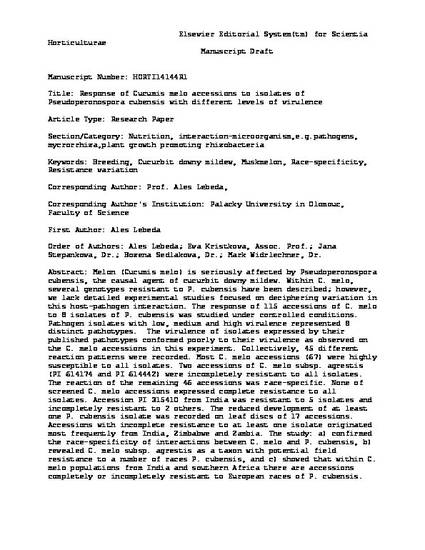
Melon (Cucumis melo) is seriously affected by Pseudoperonospora cubensis, the causal agent of cucurbit downy mildew. Within C. melo, several genotypes resistant to P. cubensis have been described; however, we lack detailed experimental studies focused on deciphering variation in this host-pathogen interaction. The response of 115 accessions of C. melo to 8 isolates of P. cubensis was studied under controlled conditions. Pathogen isolates with low, medium and high virulence represented 8 distinct pathotypes. The virulence of isolates expressed by their published pathotypes conformed poorly to their virulence as observed on the C. melo accessions in this experiment. Collectively, 45 different reaction patterns were recorded. Most C. melo accessions (67) were highly susceptible to all isolates. Two accessions of C. melo subsp. agrestis (PI 614174 and PI 614442) were incompletely resistant to all isolates. The reaction of the remaining 46 accessions was race-specific. None of screened C. melo accessions expressed complete resistance to all isolates. Accession PI 315410 from India was resistant to 5 isolates and incompletely resistant to 2 others. The reduced development of at least one P. cubensis isolate was recorded on leaf discs of 17 accessions. Accessions with incomplete resistance to at least one isolate originated most frequently from India, Zimbabwe and Zambia. The study: a) confirmed the race-specificity of interactions between C. melo and P. cubensis, b) revealed C. melo subsp. agrestis as a taxon with potential field resistance to a number of races P. cubensis, and c) showed that within C. melo populations from India and southern Africa there are accessions completely or incompletely resistant to European races of P. cubensis.
Available at: http://works.bepress.com/mark_widrlechner/148/

This is a manuscript of an article published as Lebeda, Aleš, Eva Křístková, Jana Štěpánková, Božena Sedláková, and Mark P. Widrlechner. "Response of Cucumis melo accessions to isolates of Pseudoperonospora cubensis with different levels of virulence." Scientia horticulturae 200 (2016): 45-54. doi: 10.1016/j.scienta.2015.09.028. Posted with permission.